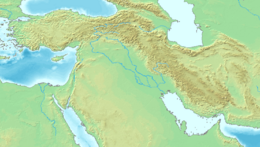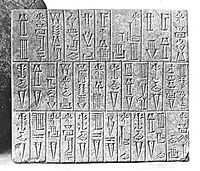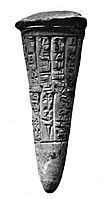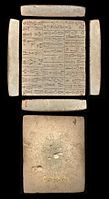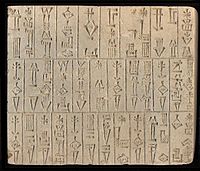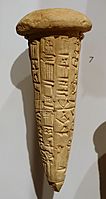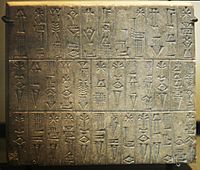Ur-Baba facts for kids
Quick facts for kids Ur-BabaSumerian: 𒌨𒀭𒁀𒌑 |
|
|---|---|
| Ruler of Lagash | |
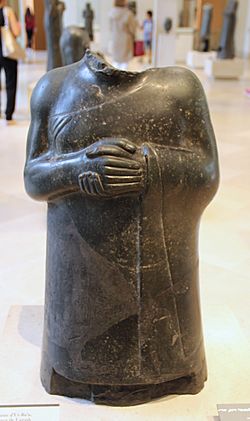
Diorite Statue of Ur-Ba'u (Ur-Baba), Prince of Lagash. Louvre Museum, AO 9.
|
|
| Reign | c. 2100 BC |
| Predecessor | Kaku or Kakug |
| Successor | Gudea |
| Dynasty | Ruler of Lagash |
Ur-Baba (also spelled Ur-Bau) was an important ruler of an ancient city called Lagash. He was known as an ensi, which means a governor or ruler. He lived a very long time ago, around 2100 BC.
Ur-Baba's name means "servant of the goddess Bau." Bau was a special goddess in ancient Sumer. In some old writings, Ur-Baba even said he was a child of the god Ninagal.
Who Was Ur-Baba?
Ur-Baba ruled the city of Lagash in ancient Mesopotamia. This was a powerful city-state in what is now modern-day Iraq. He was in charge for about 13 years.
Lagash's Golden Age
During Ur-Baba's time, Lagash was strong and independent. It was not controlled by the larger Akkadian Empire, which was a big kingdom nearby. This made Lagash a very successful place.
Ur-Baba helped Lagash grow and become wealthy. His rule brought peace and good times to the people. Many buildings and temples were likely built during his reign.
Family and Successor
Ur-Baba had a daughter named Ninalla. She married a man named Gudea. After Ur-Baba's rule ended, Gudea became the next ensi of Lagash. This kept the leadership within the family.
Gudea also became a very famous ruler of Lagash. He continued the good work that Ur-Baba had started.
Ancient Discoveries
We know about Ur-Baba from old writings found on clay tablets and cones. These objects tell us about his life and what he did as a ruler. They are like ancient history books!
These discoveries help us understand what life was like in ancient Sumer. They show how important leaders like Ur-Baba were in shaping their cities.
-
Tablet of Ur-Baba, Girsu.
-
Ur-Bau foundation tablet. Walters Art Museum
-
Ur-Bau foundation tablet (front detail). Walters Art Museum
-
Ur-Baba inscription plaque enumerating the temples erected by him; Louvre collection (AO 261).
See also
 In Spanish: Urbaba para niños
In Spanish: Urbaba para niños
 | Kyle Baker |
 | Joseph Yoakum |
 | Laura Wheeler Waring |
 | Henry Ossawa Tanner |


